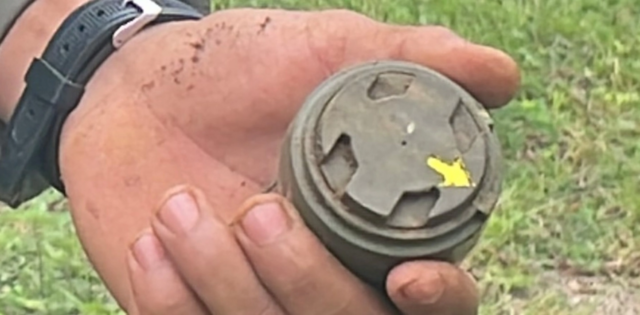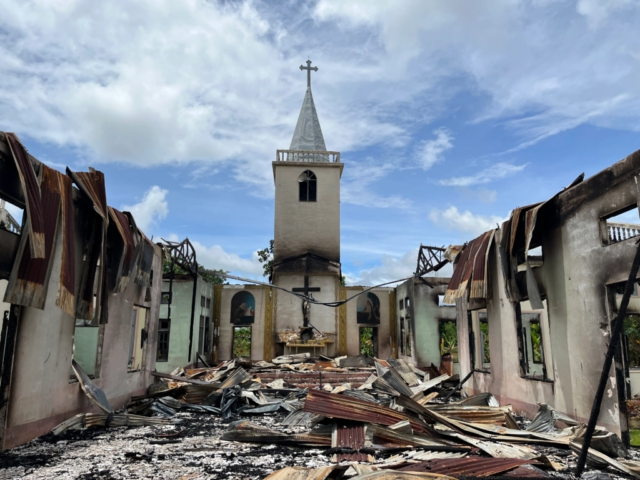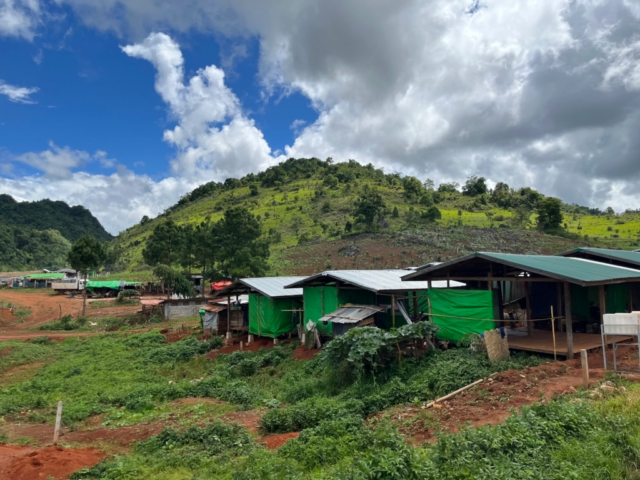Myanmar: Military’s use of banned landmines in Kayah State amounts to war crimes


- Inherently indiscriminate landmines kill and injure civilians
- Military laid landmines in homes, on farming lands and on church grounds
- Myanmar increasingly isolated globally in its use of antipersonnel landmines
The Myanmar military is committing war crimes by laying antipersonnel landmines on a massive scale in and around villages in Kayah (Karenni) State, Amnesty International said today after an on-the-ground investigation in conflict-affected parts of the state.
Antipersonnel landmines are inherently indiscriminate and their use is internationally banned. The landmines laid by the Myanmar military have killed and seriously injured civilians and will have significant long-term consequences, including on displaced people’s ability to return home and to farm their lands.
“The Myanmar military’s use of landmines is abhorrent and cruel. At a time when the world has overwhelmingly banned these inherently indiscriminate weapons, the military has placed them in people’s yards, homes, and even stairwells, as well as around a church,” said Matt Wells, Amnesty International’s Crisis Response Deputy Director – Thematic Issues.
The Myanmar military’s use of landmines is abhorrent and cruel.
Matt Wells, Amnesty International’s Crisis Response Deputy Director – Thematic Issues
“The world must urgently respond to the military’s atrocities against civilians across Myanmar. Countries around the world must cut off the flow of weapons to Myanmar and support all efforts to ensure those responsible for war crimes face justice.”
From 25 June to 8 July, Amnesty International researchers interviewed 43 people in Kayah State’s Demoso, Hpruso, and Loikaw Townships. These areas have been at the centre of fighting between the military and Karenni armed groups since May 2021, when conflict in Kayah State re-ignited following the military coup.
The organization interviewed landmine survivors and other witnesses, as well as health professionals who treated landmine injuries and people who had discovered and deactivated landmines in villages. It also visited several recently demined villages.
The Myanmar military is laying several types of landmines that it manufactures itself. These include the M-14, which typically blows off the victim’s foot at the ankle, and the more powerful MM-2, which often blows off the victim’s leg at the knee and causes injuries to other parts of the person’s body, with severe risk of death due to blood loss.
Antipersonnel landmines, including the M-14 and MM-2, are inherently indiscriminate and their use is banned under customary international humanitarian law, as well as the 1997 Mine Ban Treaty, which 164 states have joined. According to Landmine Monitor, Myanmar’s military is the only state armed forces confirmed to have used antipersonnel landmines in 2020-21.
Civilians killed and injured
Lu Reh, 62, and his family were displaced from Daw Thea village in Demoso Township in late February 2022 after a Myanmar military air strike killed two people in a neighbouring village. On 10 June, he and others returned to collect things from their property.
As he walked along a dirt path to collect jah fruit, Lu Reh stepped on a landmine that ripped off his right leg just below the knee, leaving the bone exposed at the calf. According to a witness and another person with direct knowledge of the incident, it also wounded his left leg and right hand and caused significant blood loss. Lu Reh died on the way to the hospital.
The Myanmar military has controlled that area since February 2022 and soldiers from the 66th Light Infantry Division (LID) have based themselves out of several nearby villages.
The Karenni Human Rights Group (KnHRG) has documented at least 20 civilians killed or seriously injured by landmines in Kayah State since June 2021. According to activists, local aid workers, and people without formal training who have tried to demine villages, the military’s use of landmines there has soared in recent months, especially as they retreat from certain areas.
In early April 2022, Rosie, 52, and her daughter Ma Thein Yar Lin, 17, were trying to return to their home in Loikaw town after being displaced by fighting in January. Rosie parked their motorbike near a rocky path, and Ma Thein Yar Lin walked a short distance away to go to the bathroom.
I heard the explosion, then I looked and saw a lot of smoke. I heard my daughter yelling, ‘Mama, Mama,’ and I went to look and saw her lying on the ground…my daughter had no leg anymore.
Rosie, whose daughter was injured in a landmine incident
“I heard the explosion, then I looked and saw a lot of smoke,” Rosie recalled. “I heard my daughter yelling, ‘Mama, Mama,’ and I went to look and saw her lying on the ground.”
“I noticed that my daughter had no leg anymore… I went searching for [her leg], but the man who [was passing by and stopped] to help us said, ‘Stop! There will be another landmine. The most important thing is to stop the bleeding.’”
Ma Thein Yar Lin lost her right leg from the mid-calf down and had landmine fragments throughout her left leg. She now uses a wheelchair donated by a friend. She and her mother cannot return to their home partly because the house and bathroom are not accessible.
She told Amnesty International that she wants to continue her studies; she had reached Grade 11 before the Covid-19 pandemic and the coup stopped her schooling. She said she also wants to ensure her leg recovers so that she can be fitted with a quality prosthetic.
Attack on a church
On 27 June 2022, Amnesty International researchers visited St Matthew’s church in Daw Ngay Khu village in Hpruso Township. The military had planted at least eight landmines on church grounds in mid-June, when there was fighting in the area.
Amnesty International photographed areas where landmines had been removed, including along the main entrance path and behind the church. People involved in demining the church believed there were more landmines there that had yet to be discovered.

St Matthew’s church, which Myanmar soldiers burned on 15 June 2022 after laying landmines in the compound.
On the afternoon of 15 June, soldiers also burned down the church and the priest’s house next door. When Amnesty International researchers visited 12 days later, the grain stored in the priest’s house was still smouldering.
A 41-year-old woman from Daw Ngay Khu told Amnesty International: “That church was the centre of our village. We worried about our things [when the military started coming], so we brought them to the church to keep [them] there. We thought the Myanmar military would not attack the church, that it was a hallowed place.”
Researchers saw a discarded uniform of the 66th LID on the church grounds, along with bullet casings and a used round from a 40mm grenade launcher.
Amnesty International previously implicated the 66th LID in war crimes and likely crimes against humanity in Kayah State, in a report published in June 2022.
In addition to the church, Myanmar soldiers laid landmines in and near homes in Daw Ngay Khu village, according to six people who lived there as well as people who had demined parts of the village. Other areas of Daw Ngay Khu likely remain contaminated.
Widespread displacement and fear
Amnesty International received credible information that the Myanmar military has laid landmines in at least 20 villages in Hpruso, Demoso, and Loikaw Townships in recent months. There are likely many more contaminated villages across Kayah and southern Shan States.
The military appears to be systematically laying landmines near where it is based as well as in areas from which it retreats. The region along the main road between Moe Bye in southern Shan State and Hpruso town in Kayah State is particularly contaminated. The military systematically burned homes in the same area from February to April 2022, as Amnesty International reported previously.
Soldiers have placed landmines in people’s yards, at the entrance of homes, and outside toilets. In at least one documented case, soldiers boobytrapped a house stairwell with a trip-wire improvised explosive device (IED). They have also placed landmines on paths to rice fields, and credible evidence indicates that at least one civilian was seriously injured recently from stepping on a landmine when going to their field.
Displaced civilians across these areas of Kayah State told Amnesty International that fighters from ethnic armed groups had warned them about the military’s use of landmines in their villages and said they should not go back. The warnings have helped to limit civilian casualties so far, but many people are desperate to see their property and to work their fields during the planting season.

Camp for internally displaced people (IDPs) in Kayah State.
Paulina, 20, a teacher from Daw Ngay Khu village, said her house was damaged by a military mortar during fighting and that soldiers then based themselves in the village. She said:
“Last year we could move back and forth and get things from our village. But this year we dare not go back… We are worried about landmines, because they plant them anywhere.”
Limited demining is overwhelmingly being undertaken by members of armed groups, who do it by hand with only rudimentary equipment and without any professional training. Contamination remains widespread.
The threat to lives and livelihoods posed by landmine contamination remains an issue in other parts of Myanmar where the military has engaged in conflict with armed groups. In 2017, Amnesty International documented several incidents of landmines injuring Rohingya women, men and children along the border of Myanmar’s Rakhine State and Bangladesh.
The military’s depraved use of landmines in homes and villages will continue to have devastating effects on civilians in Kayah State for years to come.
Rawya Rageh, Senior Crisis Adviser at Amnesty International
“The military’s depraved use of landmines in homes and villages will continue to have devastating effects on civilians in Kayah State for years to come. We know from bitter experience that civilian deaths and injuries will mount over time, and the widespread contamination is already blocking people from returning to their homes and farmland,” said Rawya Rageh, Senior Crisis Adviser at Amnesty International.
“Myanmar’s military leadership should immediately end its use of landmines and join the majority of the world in supporting the Mine Ban Treaty, which includes provisions for demining and victim assistance. “There is an urgent need for a scaled-up humanitarian response that addresses rising food insecurity and ensures proper rehabilitative, psychosocial, and other needed care for landmine survivors, as well as adequate planning for and resourcing of post-conflict demining operations to clear contaminated areas.”

